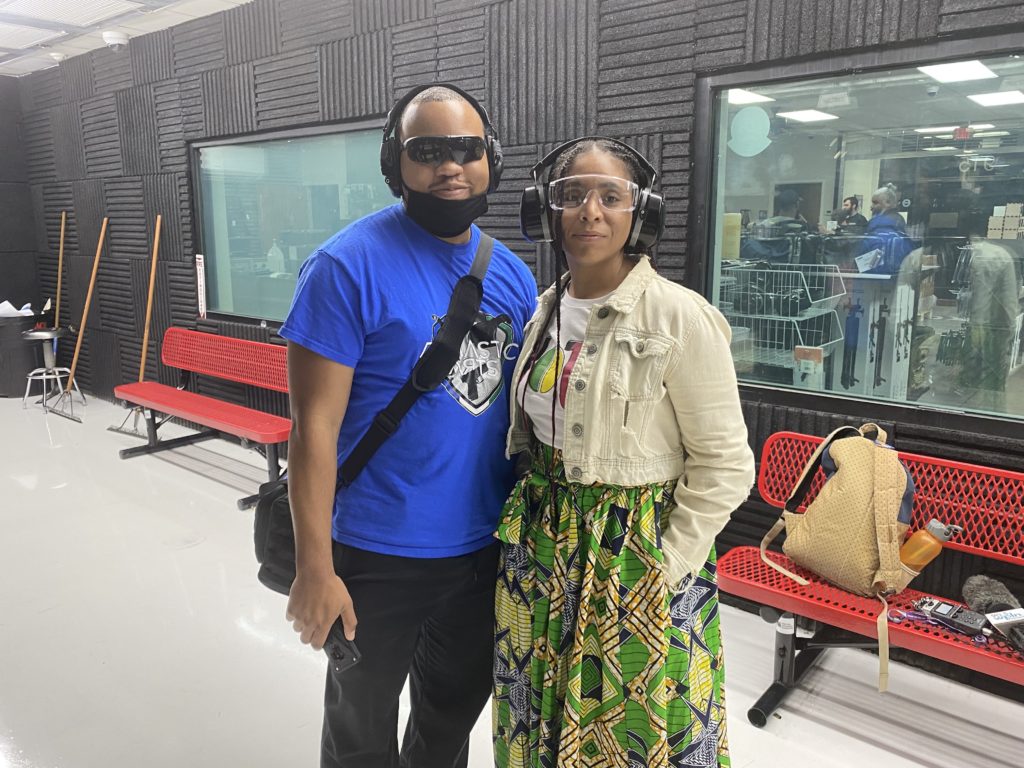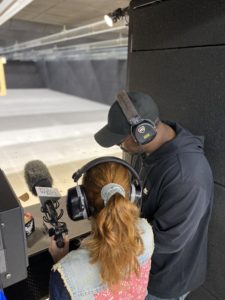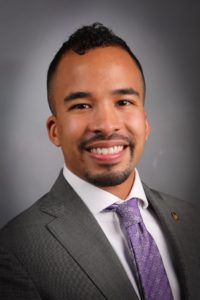
When it comes to gun ownership, Aqil Qadir knows exactly what he’s talking about.
He’s a former New York police officer, an NRA-certified firearms instructor and heads his own self-defense training company.
 Damon Mitchell WPLN News
Damon Mitchell WPLN NewsAqil Qadir, right, takes WPLN criminal justice reporter Samantha Max, left, through a lesson on firearms safety.
But despite taking pride in being able to take people through Tennessee’s handgun carry permit course, he’s not upset to see the classroom requirement eliminated.
“The handgun permit class was never adequate training anyway,” he says. “And anybody who does this for a living will tell you that.”
Effective July 1, Tennessee’s controversial constitutional carry law will remove the hours-long permit process required to carry a handgun in Tennessee — although the class is still available for residents who want it.
That means residents aged 21 and older can carry handguns, openly or concealed, without a permit. This also extends to military personnel who are 18 but under 21.
Qadir, who trains many Black firearms owners, says this could be a good or a bad thing — especially since Black people are more likely to be questioned when exercising their rights.
Racial undertones in gun control laws
According to the Tennessee Department of Homeland Security, more than 700,000 residents have valid gun permits.
The majority live in Davidson, Shelby, Rutherford and Hamilton counties.
“The reality is a lot of people are carrying whether they have a permit or not,” says Denzel Caldwell, a Nashville firearms instructor and owner of Dynastic Arts.
Tennessee’s permitless carry law has been met with a mix of support and opposition from residents and law enforcement. Gun control advocates have also said it’ll increase crime and access to guns.
I signed constitutional carry today because it shouldn’t be hard for law-abiding Tennesseans to exercise their #2A rights. Thank you members of the General Assembly and @NRA for helping get this done. pic.twitter.com/xv2ZenOEZq
— Gov. Bill Lee (@GovBillLee) April 8, 2021
But Caldwell disputes those points. He says he believes gun control is often used as a distraction to keep from dealing with issues like racial discrimination and poverty — which lead to people wanting to use guns illegally.
“Even with gun control, it has very anti-Black implications. Because when we’re talking about gun control, we’re also talking about enforcement of those laws,” he says. “And we’re also talking about the reality that those are disproportionately happening in Black communities.”
In 1967, the California chapter of the Black Panther Party raised eyebrows when they began openly carrying firearms while patrolling the streets of Oakland to protect themselves and other Black residents from police violence.
California State Assemblyman Don Mulford responded by introducing a bill, now known as the Mulford Act, to ban residents from openly carrying loaded firearms. California Gov. Ronald Reagan then signed the bill after members of the Black Panthers went to the California State Capitol to exercise their right to carry a firearm.
Today, California has some of the strictest gun laws in the country. Soon after, the Mulford Act inspired a series of other gun control bills across the U.S. That’s why Caldwell says constitutional carry could be a good thing.
“I personally think that, speaking specifically for Black folks, it decreases the amount of opportunities for us to get locked up,” he says.
Give and take of permitless carry
Some experts say that has been the case in Missouri since it enacted its own constitutional carry law in 2017.
Missouri State Sen. Steven Roberts, who served as a St. Louis prosecutor when the law was enacted, says after the law passed, police officers would arrest someone based on them carrying a fireman without a permit, leading to a search that would find contraband.
Because of the constitutional carry law, however, the cases would be thrown out.
“We’d have officers bring in cases that normally before this constitutional carry law passed I could issue,” he says. “But once it went into effect I’d no longer be able to issue this type of case. … I wouldn’t be able to issue it because it was an unlawful search and seizure.”
 Missouri General Assembly
Missouri General Assembly Missouri State Senator Steven Roberts.
Still, Tennessee’s law is somewhat different from Missouri’s. And Caldwell, the firearms instructor, says there are layers to his support of permitless carry. He disagrees with certain aspects of the law.
While the law could reduce criminal convictions, the bill does increase the penalties for gun crimes — which are more likely to be enforced on Black residents. This includes raising the theft of a firearm from a misdemeanor to a felony, and raising jail time for a conviction from 30 days to six months.
Exercising your rights while Black
Then there’s the question of whether Black gun owners could be endangered by this law, especially with the history of Black men and women being questioned, or even killed, when exercising their rights.
“When we talk about training and staying calm and maintaining composure even in the face of disrespect [and] dehumanization, it’s a matter of making sure that you make it home,” says Caldwell. “It’s [a] survival tactic. It’s not a moral judgement.
This is something that Tanea McClean, who teaches gun classes and co-runs the Middle Tennessee Black Gun Club with Caldwell, has been thinking about.
McClean is a Black firearms expert. She’s also the founder of Surreal Self-Defense.
“Are they even going to care that it’s constitutional carry when they deal with me and I have a firearm on me?” she says.
Because of that uncertainty, McClean still advocates that Black gun owners go through the permit process. She also says it would allow them to benefit from the state’s gun reciprocity agreements — which means being allowed to carry in states that recognize Tennessee handgun carry permits. McClean says extra gun training is important too.
“Being Black in America, every layer of protection [and] certification that shows I understand what I’m doing [is important],” she says. “Intentionally making sure I’m following the laws can never hurt us.”
 Damon Mitchell WPLN News
Damon Mitchell WPLN NewsDenzel Caldwell, left, and Tanea McClean, right, discuss their thoughts on Tennessee’s constitutional carry law at Citizens Safety Academy in Murfreesboro, Tennessee.
But even then, she says being credentialed is sometimes not enough.
In 2016, Minnesota resident Philando Castile, who was Black, was shot and killed by a cop after reportedly telling him he was licensed to carry as he reached for his wallet. The cop was found not guilty during a trial.
And in 2018, a Black armed security guard named, Jemel Roberson, was shot and killed by police in Illinois after detaining a bar shooting suspect.
This is on top of hundreds of other shootings of Black men and women — many of whom were unarmed.
McClean says knowing these stats is an added responsibility of being a Black gun owner.
“Learning proper skills for de-escalation and learning how to deal with the police,” she says. “Those type of conversations in the classroom are very necessary.”
She says while everyone should be able to operate within the law freely, Black people must take extra steps to better protect themselves and their community.

